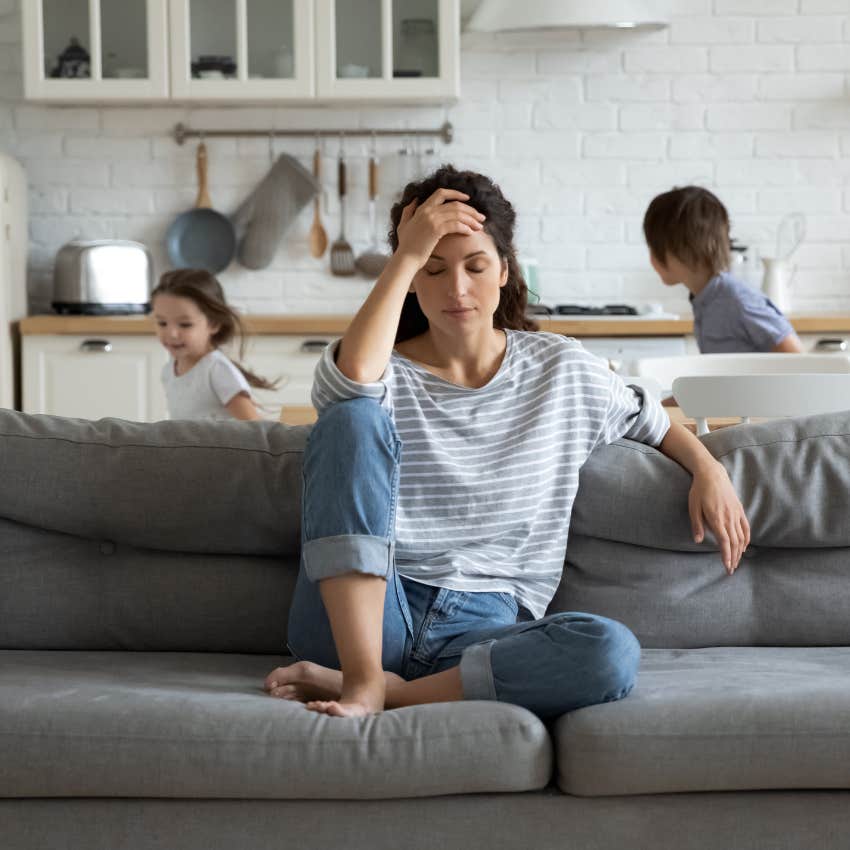The Hidden Costs Of Divorce That Prove It's Never Casual
Walking away is far from easy.
 Henry Ravenscroft | Unsplash
Henry Ravenscroft | Unsplash To hear some people talk, you might think that women these days are getting divorced all willy-nilly. We’re jumping on the divorce bandwagon because it’s trendy. We’re breaking up families and telling our partners to get lost because we just don’t feel like working on our marriages.
We have no respect for our wedding vows, we can’t be trusted, and we don’t value commitment. Well. As someone who has been separated for just over a year and who may be facing my soon-to-be ex-husband in court next month, I’m here to tell you that there is absolutely no such thing as a casual divorce.
The hidden costs of divorce that prove it's never casual
 fizkes / Shutterstock
fizkes / Shutterstock
The first time I thought about divorce was back in 2018. My husband had just completed a three-month internship in another state, during which I solo-parented our three- and six-year-old children.
It was exhausting, in some ways, though by then I was already used to being the primary caregiver. I already got the kids ready in the morning, handled most of their school and daycare drop-offs and pick-ups, commuted to work downtown, and orchestrated dinner and bath time.
My husband was in school, had been in school for most of the years since our first child was born, and this was how I justified taking on the extra labor. During his internship in another state, I did miss the thorough cleaning he did after dinner, which included sweeping the entire house and wiping down all the surfaces.
I did miss his body in the bed at night, and I really missed it in the morning, when I was used to sneaking out for my daily run. I did give myself multiple timeouts a day while attempting to manage the Big Emotions of young children, shutting the door to our mudroom and sitting on the steps to catch my breath.
But, I also felt weirdly at peace.
There was one less person in the house with the potential to cause conflict, and in many ways, doing everything was much easier than doing almost everything and trying to delegate the rest. It was during those three months that I first learned about the term “emotional labor,” and the nagging discomfort I’d felt with the gendered disparity in caretaking duties began to tug at me more insistently.
When my husband returned from his internship, the initial excitement quickly gave way to resentment. He had a test to study for, a test he should have been studying for over the past three months but hadn’t.
I found myself still more or less solo parenting, but now with another adult in the house. An adult who also demanded my care.
I didn’t start seriously thinking about divorce back then because it seemed … well, impossible.
But I did occasionally fantasize about a life in which I could focus on parenting my children, and even get a break when they went to a different house to spend time with Dad.
I secretly envied the divorced women I knew who had shared parenting responsibilities with their ex-husbands. They seemed so … liberated! They could do things their way! They had time to themselves! They didn’t have to take on and delegate labor under the shadow of another adult!
It seemed dreamy in a way, but completely out of reach. My husband needed both my emotional and financial support to get through school; we could barely afford one home, let alone two; and I couldn’t fathom putting my kids through such a drastic transition. Not only that, I had my pride. I’d made a choice about who to marry, and I didn’t want to be wrong.
Plus, once my husband was done with school, things would level out. Things would get better.
Things sort of got better. Then worse, then better.
Every time we hit a plateau, I thought, “This is it. This is where it all levels out.” But it never did.
I hit another inflection point in the fall of 2022, when my husband and I lived apart for five weeks. For the first week, I barely managed to drag myself out of bed to get the kids to school in the morning. Once I processed the initial shock of the crisis that had landed me and the kids in a hotel for a night, I turned my attention to saving my marriage.
With the clarity of hindsight, I should have ended things then. But if I couldn’t fix my marriage and family, I held out hope that maybe a small village of therapists could.
It took me the full five weeks, with a reduced work schedule, to build a village of therapists who actually had openings and took our insurance. But with the help of a marriage counselor for us, a therapist who specialized in trauma for my husband, and a culturally appropriate therapist for my biracial daughter, maybe, just maybe, we could find a way through.
It wasn’t our first foray into therapy, but this time, we would commit. This time, it would be different.
It was two and a half years later that I finally worked up the courage to ask for a separation. And still, even then, I wasn’t committed to divorce.
Still, even then, I thought maybe we could find a way to make things work. And after all this — all this! — my husband’s story is that I randomly walked away.
The myth of the “casual divorce” is not just about what leads up to the divorce. It’s also about the divorce process itself.
Anyone who uses “casual” and “divorce” in the same sentence has clearly not been through this process.
Even in the lowest-stakes scenario — say, a couple who is more or less in agreement about the divorce and doesn’t involve lawyers, a couple who rents a home, has no kids, and owns few assets — divorce is a significant life transition that involves a lot of tedious paperwork and hundreds of dollars in fees. This couple will still have to figure out how to afford to rent two different living spaces, how to divide up whatever things they have, and how to navigate the intricate legal bureaucracy of dissolving a marriage.
But since around 70% of divorces involve the division of property and nearly 50% of divorces involve children, the stakes are usually quite a bit higher. And in these more complex cases, the bureaucracy becomes even more intricate, often requiring lawyers even if the divorce is not rife with conflict.
When a husband feels blindsided, I’ve learned the hard way, the divorce is highly likely to be rife with conflict. Even taking into account the considerable drama during my marriage, I never, ever, would have predicted the drama of my divorce.
Surely my husband, after having some time apart to reflect, would explore his own role in my unhappiness. Surely, he would ultimately respect my decision to separate and agree to take some level of accountability.
In the divorce papers, a full seven months after our initial separation, he stated that I “lost emotional control” and kicked him out. He said the same thing during our first mediation session two months later and said it again during our second mediation session three months after that.
It’s been over a year, and it’s still the same story. No self-reflection. No accountability.
Since he is undeniably the victim, his goal in divorce has one aim and one aim only: to extract as much money from me as he possibly can. He claims to want to see his children, but doesn’t follow through on the co-parenting arrangements we agreed upon in mediation, and his occasional demands for 50/50 parenting time are not only logistically impossible, but also immediately followed by requests to renegotiate child support. Which doesn’t really matter because he’s not paying it anyway.
There’s an enduring social narrative that men are the ultimate victims of divorce — a narrative propelled by men having an outsized public voice and frequently using their platforms to complain about their ex-wives. As Robin Williams famously said, “Ah yes, divorce, from the Latin word meaning to rip out a man through his wallet.”
Well yeah, maybe if you’re Robin friggin’ Williams. But studies show that women who aren’t married to world-famous Hollywood actors actually fare worse than their husbands financially during and after divorce. They are also far more likely to take on more solo parenting or become single parents, and to struggle with more vicious social stigmas.
Family law dictates that assets be divided equitably, which assumes that the marriage itself was equitable. Of course, we all know that’s seldom the case, especially in marriages that are ending in divorce.
 Prostock-studio / Shutterstock
Prostock-studio / Shutterstock
Unpaid caregiving and household labor is somewhat accounted for when one person in the couple (usually the woman) forewent paid labor to take it on, but when both parents engage in paid labor, which is the case in 66.5% of married couples with children, there is no accounting for the inequitable division of unpaid labor in the home. Men often complain that women get to keep the home, leaving out that it’s usually because women are continuing to take on disproportionate caregiving responsibilities after divorce, and also leaving out that they get half the equity.
In fact, most of family law as it relates to asset division is based on magical thinking. Very few families, especially in this day and age, can actually afford to pay for two homes and remain financially solvent.
If I’m “lucky,” I will owe my soon-to-be ex-husband $89,000 after divorcing, which doesn’t include $15,000 - $20,000 in legal fees. For the record, I don’t have $100,000 sitting in my bank account. I’ll still be a homeowner, yes, but with additional debt, nothing in the way of savings, full-time caretaking responsibilities, and a vastly reduced retirement account.
I say all this not to cast myself as the victim, but to illustrate that there is absolutely nothing casual about this divorce. Not only had the notion of it been percolating in my head for seven+ years, but for the past six months, the actual reality of it has consumed untold hours of my time each week, and frequently made me both furious and deeply fearful. And though my case may be on the extreme end of things, I would bet good money that most women who have been divorced can relate to at least one, if not more, of the challenges I’ve described.
So, now that I’m knee-deep in divorce, essentially a single parent, and dangling on the precipice of losing financial stability that I spent years building and fighting for, here’s the million-dollar question:
Do I regret it? In a word, no.
While women fare worse financially after divorce, we fare better emotionally. In fact, according to Science Daily, Women tend to become much happier and satisfied with their lives after their divorces come through, according to researchers at London's Kingston University.
The study published in the journal Economica shows that women are significantly more content than usual for up to five years following the end of their marriages, even more so than their own average or 'baseline' level of happiness throughout their lives.
In many cases, this means that women are happier as financially gutted and socially stigmatized solo parents than they were as financially stable and socially respected wives.
Which begs the question: What is going on in heterosexual marriages?
This is a question that lots of women seem to be asking these days. The fact that in seven of 10 divorces, women are still taking the initiative to end their marriages, even with the disproportionate sacrifices involved, should be leading men to do some deep soul-searching and self-reflection.
Some are. I know I have male readers who have embarked on this journey with humility and curiosity. But most men, unfortunately, aren’t. They are too busy complaining that they were blindsided, that their wives, as my soon-to-be ex-husband put it, “lost emotional control.” That we just randomly went nuts, walked away, and slammed the door on our way out.
The Internet is full of men bemoaning their divorces, and often still blaming their ex-wives, while women are gleefully celebrating our liberation from the confines of an institution designed to control and constrain us.
I’m all for celebration. I treasure the serenity I’ve found living apart from a man who devalued my labor, disrespected my time, and cast a dark emotional shadow over our family. I have been able to invest my increased energy into my children, my friends, my first family, and most importantly, myself. When this is said and done, I plan to throw an epic divorce party.
But in celebrating my divorce, I don’t want to glamorize it. The transition has been rife with strong and conflicting emotions — deep fury, fear, and grief claw at my joy and serenity on a near-daily basis.
The process itself has been a money- and energy-sucking hole, and finalizing the divorce doesn’t mean it will be over. I will still be faced with the prospect of co-parenting, in some form or fashion, with someone who, even after taking all my money and leaving me to care for our kids, still casts me as the villain and hates my friggin’ guts.
This is not to scare anyone who might be thinking about ending their marriage. It’s simply to reiterate that nothing about divorce is casual. It’s premeditated, usually for years and years, and comes at a great cost.
Instead of bemoaning all these “frivolous” divorces, let’s talk more about the reality of what divorce entails, particularly for women, and about how absolutely nuts it is that most of us still deem divorce worth it in the end.
Kerala Taylor is an award-winning writer and co-owner of a worker-owned marketing agency. Her weekly stories are dedicated to interrupting notions of what it means to be a mother, woman, worker, and wife. She writes on Medium and has recently launched a Substack publication Mom, Interrupted.

